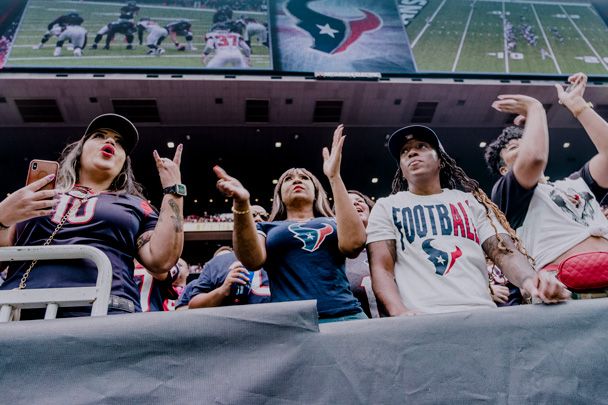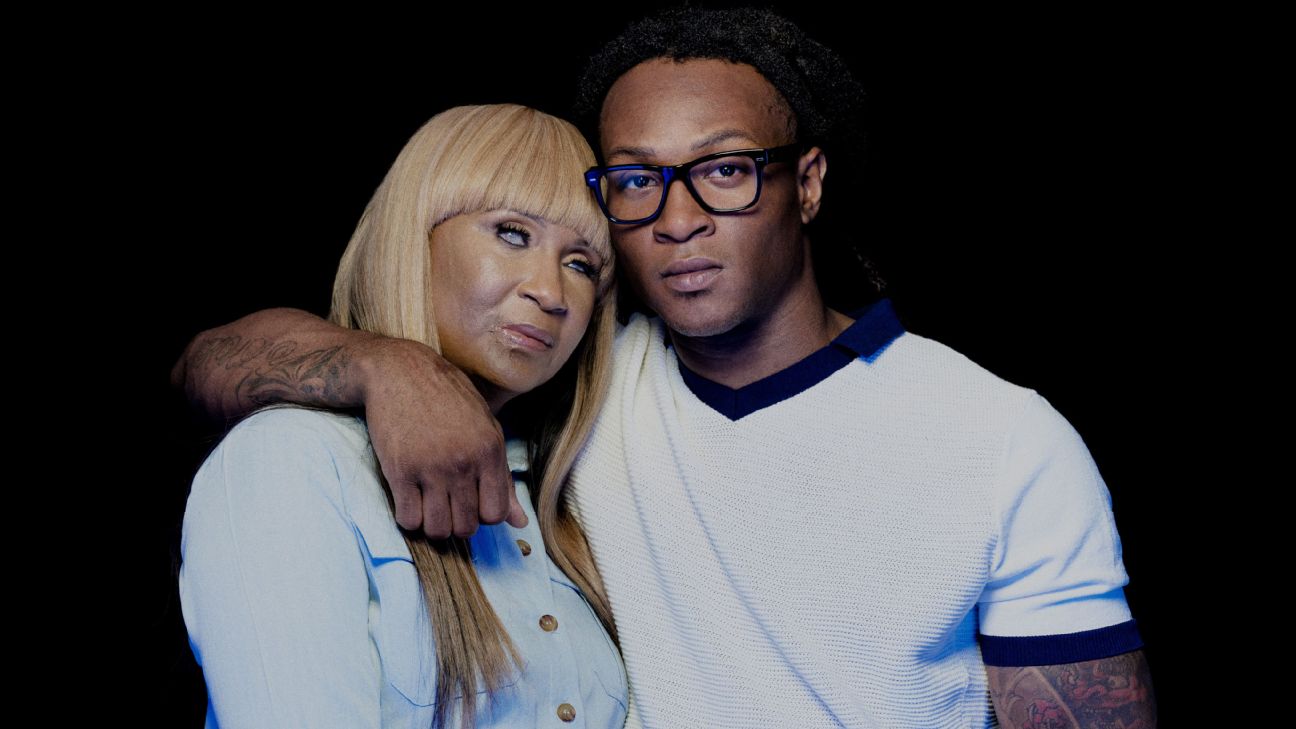WHEN HOPKINS’ SISTER Kesha answered the family’s landline that afternoon, she had no idea where her mother had gone. She passed the phone to her grandmother, who burst into tears when she heard that Greenlee had been rushed to the emergency room. She grabbed the kids — DeAndre was in Georgia, visiting his father’s family — and drove them to the hospital. Kesha, then 14, remembers catching a glimpse of her mother as she rolled past them in a gurney. “She’s really light-skinned, but the entire right side of her face was black,” she says.
Greenlee was airlifted to a burn center in Augusta, Georgia, where she lay in a medically induced coma as doctors grafted skin from her chest and back onto her face. Back in South Carolina, Hopkins and his siblings waited, unsure of when, or if, their mother was going to come home. “Having her taken away temporarily like that, it was hard,” he says. “You don’t really know what your next day is, or what you’re gonna do … because you feel like you’re all alone in the world without your mom or dad.”
Finally, after several weeks, Greenlee woke up. She struggled to speak at first, and her vision was gone; her face was still mottled and swollen from the surgeries. She returned home while her children were out with Hicks and waited for them to come back. When she opened the door to greet them, Shanterria, her youngest, backed away in fear, as though she had seen a ghost. “That broke Sabrina’s heart,” Hicks says.
Ten-year-old DeAndre was equally terrified. “I was in shock that somebody could look like that,” he says. “It was really scary — and to think that’s my mom, she’s gonna be like that the rest of her life. I was hoping that it was a dream.” He was too young to process the emotional scope of what had happened, too afraid to ask her the simple questions bubbling up in his mind. He wondered if she’d ever watch him play football again.
With the help of her family and friends, Greenlee began to ease back into her old life. She learned to move around the house without a cane, her hands grazing the walls like she was stroking an animal’s fur; she taught herself how to execute simple household chores so she could care for her kids. But when they boarded the school bus every morning, leaving her alone, she found herself sinking into a vast spiritual darkness. She rarely emerged from her bedroom, only leaving the house to go to doctor’s appointments, and she drank heavily to numb her depressive thoughts. “I’ve been here before, not knowing what to do,” she says. “But now I’m back here again, and I’m the only source of support that my children have … now I’ve failed them.”

“I’ve not always been your typical role-model mother, and he still respects me enough to let everybody see him give me that ball,” says Greenlee, at the Falcons-Texans Week 5 game. “That ball symbolizes so much more than people ever could understand.” Benedict Evans for ESPN
Greenlee couldn’t go back to her manufacturing position at the automotive plant, so she’d pick up odd jobs like babysitting to make ends meet. She also sold drugs. Some days, Kesha says, the two of them would sit at the kitchen table with bags of product, waiting for customers to knock on their door. Greenlee says she did business throughout the night. “I thought I was doing what I needed to do,” she says. “In hindsight, it was the worst thing I could’ve done, when you have kids that are just trying to go to sleep and get up in the mornings to go to school … but I was just seeing it as a way to make money.”
Hopkins was just a child, but he was old enough to intuit that the visitors who streamed through the family’s doors didn’t belong in his house, and he found their presence unsettling. Hicks says she would occasionally pick up DeAndre from practice, and he would tell her he didn’t want to go home. “It wasn’t a peaceful place,” he says. Some weeknights, as late as 11, he would lace up his sneakers and run for miles. Not because he harbored a preternatural work ethic as a middle schooler or because he coveted freedom, but because he simply wanted to get away.
Football helped. By the time Hopkins was in his early teens, everyone in their tiny town knew he was a future star, and locals would flock to the field when his team played, watching him from the road if there wasn’t room on the grass. After Greenlee’s accident, she tried to venture to one of those games, wrapping her face in bandages before stepping outside. She instantly regretted it. Even though she couldn’t see anyone, she was certain that everyone was staring at her, whispering rumors about what had happened. (Her attacker, Savannah Grant, was sentenced to 20 years in prison for assault and battery with intent to kill; the boyfriend was not charged.)
Afterward, she holed up in her house, refusing to leave for days on end. “I knew he wanted me there, but it was really tough,” she says.
Hopkins asked her to come back.
She said no.
He kept asking.
“I was able to cope with being blind and the scars and the ridicule. And I think it gave me the courage to eventually find myself.”
– Sabrina Greenlee
Finally, she relented and let family members take her to one of her son’s games. As they do now, her children clustered around her and gave her breathless play-by-play. Images of Hopkins performing acrobatic feats on the field crowded out her fears. Instead of conjuring up a mental picture of herself as a monster, she envisioned the person her son saw when he turned to look at the sideline after making a jaw-dropping play: a mother who deserved his unconditional love. “I was able to cope with being blind and the scars and the ridicule,” she says. “And I think it gave me the courage to eventually find myself.”
Every day, as she took new steps outside the safe confines of her home, her boundaries expanded — and her son’s world exploded. By the time Hopkins was in high school, his skills had caught the attention of a few colleges. “He was as good as that area had ever seen,” says Clemson head coach Dabo Swinney, who’d been the Tigers’ wide receivers coach before he took over the program in 2008. “You don’t teach a guy to catch a ball like he can catch the ball. That’s just God-given.” While he was widely recruited, Hopkins chose to stay home, at Clemson. He told his mother it wasn’t because of her, but everyone knew that was a lie. When the Tigers played in Death Valley, she sat in the stands, shuddering with awe whenever DeAndre’s name reverberated around the stadium.
After a solid start to his college career, Hopkins broke out during his junior year, amassing 1,405 receiving yards and 18 touchdowns. While some scouts wondered whether his lack of straight-line speed might hurt his draft stock, it was never a question, he says, that he’d leave school for the NFL when the opportunity arose. “We needed food on the table,” he says. “I always knew I took care of more than myself from a young age. People depended on me.”
One football can take you so far.
When the Texans selected Hopkins with the 27th pick in the 2013 draft, he was waiting for the call at a restaurant in his hometown, surrounded by a raucous crowd of family and friends. Hopkins wore a white dress shirt with suspenders; he was too nervous to eat his favorite foods. A framed picture of his father was propped up on a table in front of him, facing forward so everyone could see his face. His mother, as always, sat by his side.
